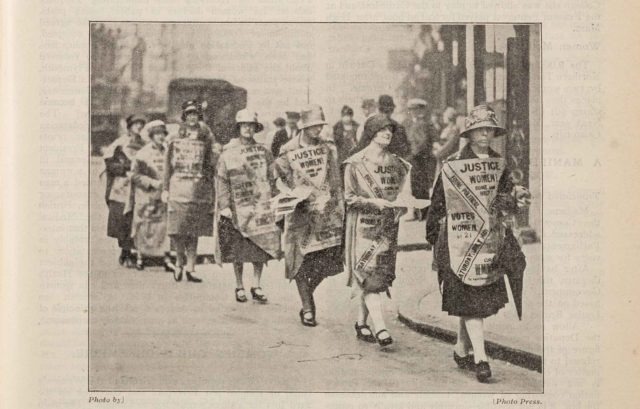We are excited to announce a fully funded PhD opportunity that builds on partnerships formed through the Time and Tide: Connections and Legacies project.
‘Feminism Between the Waves: A Political and Cultural History of the Six Point Group’ was devised by Catherine Clay (Nottingham Trent University) and Gillian Murphy (The Women’s Library at London School of Economics) and is a Collaborative Doctoral Award funded by the AHRC’s Midlands4Cities Doctoral Training Partnership. We are delighted that Zoe Thomas (University of Birmingham) will join us on the supervisory team.
The Six Point Group, Britain’s leading gender equality organisation between the two world wars, was closely associated with Time and Tide which regularly promoted its activities and campaigns. The doctoral student appointed to this project will reconstruct the history of the Six Point Group from its archive at the Women’s Library (TWL@LSE) alongside periodicals including Time and Tide and enrich our understanding of feminist campaigning between feminism’s so-called ‘first’ and ‘second’ waves.

This research project will result in the first comprehensive study of the Six Point Group (1921-1982) across its 61-year history and restore to view a continuous history of feminist campaigning in a period during which feminism is conventionally believed to have ‘collapsed’ or ‘subsided’ prior to its ‘re-emergence’ in the 1970s with the Women’s Liberation Movement. Dale Spender famously stated in 1983 that: ‘There’s always been a women’s movement this century’. This project will give credence to Spender’s claim and complicate the dominant ‘wave’ narrative that continues to shape our ideas of women’s history.
Questions to be addressed by the project include:
-
- What were the goals and achievements of the Six Point Group, and how did these evolve over its 61 years’ existence?
- What connections can be identified between the Six Point Group and other feminist and women’s organisations?
- What strategies did the Six Point Group use, to advance its aims and to negotiate competing positions within the women’s movement?
- Does the history of the Six Point Group provide critical and political tools useful for feminist thinking and practice today?
The award-holder will have previous experience and skills in historical and archival research and an active interest in contemporary feminisms and women’s history. In addition to the PhD thesis, the award-holder will gain or develop experience in the archives, museum and heritage sector by working with TWL@LSE in the following ways:
-
- Contributing to the events and exhibition programme at LSE Library;
- Contributing to the digitisation programme at TWL@LSE;
- Assisting in TWL@LSE’s preparations for the Equal Franchise Act centenary in 2028.
They will also have opportunities to disseminate their research findings via this website.
For full details including information on how to apply, please visit the M4C website which can be found here.